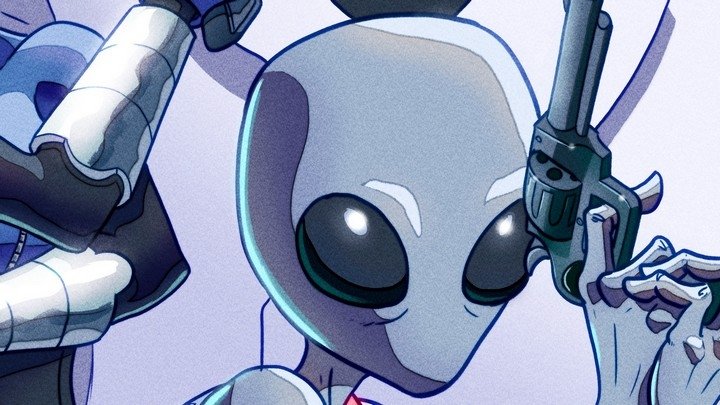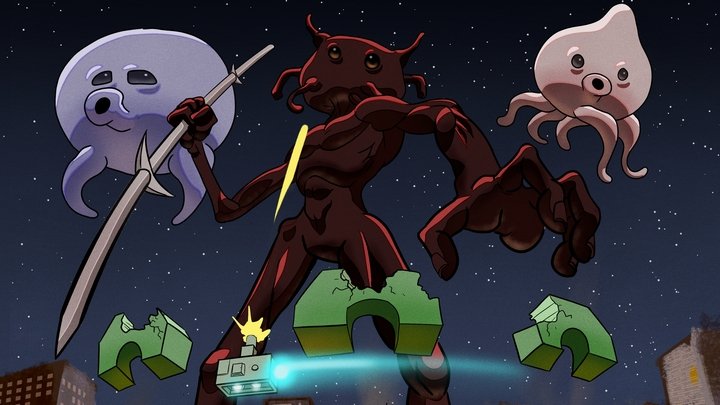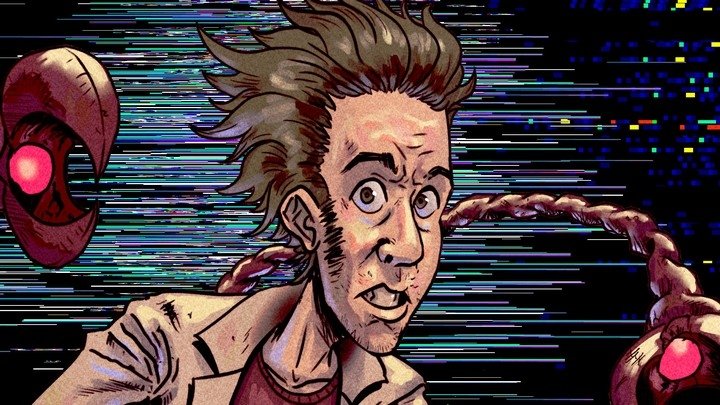Review: Promise Mascot Agency
Hot Pinky Summer
Five years ago, Paradise Killer blindsided me with its "open-world murder mystery" set on an idyllic island where cultists worshipped arcane gods. Ever since I solved the case and brought the curtain down on that world, I've wondered what developer Kaizen Game Works would come up with next, perhaps a sequel or a spinoff that offered more malfeasance or dark deities to investigate.
What I never would have expected is anything along the lines of Promise Mascot Agency, their latest creation which launches today, April 10. Aside from its open-world nature and a few well-hidden shared elements, the two games couldn't have less to do with one another. Yet Promise Mascot Agency successfully lured me into its forgotten coastal town where every crisis can be solved by hiring a soft, cuddly entity with a giant head.
Whenever a player sits down with Promise Mascot Agency, the title screen asks them to "press any button to begin your redemption." In the case of protagonist Michizane Suguwara—a.k.a. The Janitor—he seeks to protect his crime family from their rivals after a botched business deal sends his organization 12 billion yen into the red. The Janitor takes the fall and takes off to the (fictional) community of Kaso-machi; the town's name is a sort of pun, the equivalent of calling a deserted frontier hamlet Depopulatedville.
Taking control of a disgraced thug in rural Kyushu might give you the idea that Promise Mascot Agency plays like an installment in the Yakuza/Like a Dragon series, especially with lead actor Takaya Kuroda—Kiryu himself—voicing The Janitor. Yet at no point will you get into any fights or sing even a single song at a karaoke bar. Instead, The Janitor assumes control of his family's final asset and drives around Kaso-machi trying to rebuild his new venture, a mascot agency operating out of a love hotel. Putting his violent past behind him, he must make contacts with various public officials, local business owners, and out-of-work mascots—all while convincing them that he's turned a new leaf.
Once you've got employees to manage and venues willing to hire them, the real game begins: Each in-game day has you send out mascots to fulfill clients' wishes and earn cash for your agency. Which jobs they take, how much of a cut they earn, and other details all fall upon you to decide. You then have to allocate your income towards everything from basic utilities to marketing to hiring subcontractors in other regions.
The mascots act independently, going to the gigs you select and returning after a set number of "hours," during which time players get to explore Kaso-machi and experience the usual open-world video game trappings. Side quests lie in every back-alley and vacant factory; disposing of illegally dumped garbage or recovering lost items for the citizenry not only nets you cash but also improves your reputation. The more effort The Janitor makes to build bridges, the more people are willing to do business with him.
No matter how you choose to spend your time in Kaso-machi, be it off-roading in the mountains or diligently greeting each of your new neighbors downtown, The Janitor needs to periodically send cash at an ATM to his matriarch back home in order to placate her enemies. This can prove challenging in the game's early stages when the agency might only earn a few thousand yen each day. My advice: Focus on recruiting and making new clients first and leave the collectibles for later, for if you play your cards right there will be plenty of time afterwards to just cruise around town and enjoy the vibes.
Speaking of vibes, everything in Promise Mascot Agency looks and sounds immaculate. I've lived in Japan since 2008 and spent years working in the sticks where I saw plenty of abandoned houses and empty schoolrooms. Kaso-machi—while stylized—impeccably recreates this atmosphere, right down to the shopping street with more closed shutters than open signs. The soundtrack likewise embodies this mood with tunes that dance between past and present. I can see myself downloading this album and driving around Japan for real.
Promise Mascot Agency director Oli Clarke Smith spoke to me over email about the mutli-national effort that brought the game to life. "A lot of the early themes, characters and world design came from Ikumi Nakamura and her concept art assistant, Mai Mattori," he said. "We collaborated with them right at the start of the project, to get their take on the game." Smith also credits Nakamura for setting the game in Kyushu, as she often visited the area in pursuit of her hobby as an urban explorer.
I asked how the studio came to make such a drastically different game in the wake of their success with Paradise Killer. "When we formed Kaizen, my desire was for us to have a Kaizen House Style in our design ethos, and to make a lot of different games, rather than become known for a specific franchise," Smith said. "I wanted us to be like Human Entertainment." He said art director Rachel Noy pitched the idea of a "Kairosoft-like mascot management game" which evolved to include open-world gameplay and the yakuza. Smith said that the driving element came from a YouTube channel he fancies where a guy roams the inaka (Japanese countryside) documenting old vending machines. "We wanted that," Smith said. "We wanted to cruise round the inaka and meet people and find things."
I am always going to be an easy mark for a game about Japan—I moved here for a reason—but the originality of Promise Mascot Agency continued to impress me the longer I played. The mascots run the gamut from cute to discomforting to what-the-hell-am-I-looking-at but I delighted in meeting each new weirdo. As of this writing I've spent more than 20 hours in Kaso-machi and while I completed the main story, I'm certain the town still holds secrets for me to discover.
Since this is Retronauts, I also appreciate how Promise Mascot Agency embraces a timeless quality. With its glory days behind it, Kaso-machi obviously features a variety of run-down shops with signage harkening back to the Shōwa era. The Janitor will encounter old souls with stories to tell and young people trying to figure out their future. An entire questline revolves around a kappa who wants to introduce retro arcade games to a wider audience. Characters carry cellphones and mention the Internet, but if you told me this story took place in 2005 or 2025, I'd believe you.
For me, the true magic of Promise Mascot Agency is how it made me care about make-believe people in an imaginary place. They did it before—Paradise Killer introduced an entire society of immortal beings living in a fantasyland of their own design—but by grounding the game in our world with its real problems, Kaizen Game Works injects a sense of hope right when I needed it most. I may not live in Kaso-machi but the issues facing that community plague millions of people in the 21st century.
Consider Kabaya King, a mascot who chooses to spread awareness of how eating grilled eel contributes to their status as an endangered species—even though he himself is a grilled eel complete with sauce. I myself stopped eating eel years ago and some days I feel like I'm alone in taking my stance. Seeing Kabaya King profess his beliefs in a video game matters, reminding me principles are worth fighting for even when the odds are against you.
We're living in "interesting times" as the saying goes. Some mornings I wake up too early and find myself unable to go back to bed as my mind races to recall the seemingly infinite number of atrocities that I am personally aware of. Playing Promise Mascot Agency cannot silence those thoughts or substitute for taking action in the real world, but it does let me engage in a curiously specific kind of power fantasy. Everyone wishes our elected officials would dare to stand up to fascism, cronyism, and corruption; pressing a series of buttons and making an anthropomorphic pinky do it in Kaso-machi felt weirdly cathartic.
Promise Mascot Agency is available today on Steam, Xbox Series X/S, PlayStation 5, Epic Games Store, and Nintendo Switch. A pre-release review code was provided by the developer.




